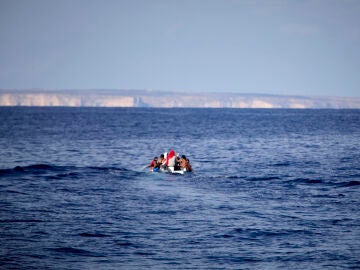
With almost 2,200 boys and girls, women and men missing or dead in the central Mediterranean so far this year, 2023 has already become the deadliest on this migratory route since 2017, according to the new report published today by Doctors Without Borders (MSF) in which it is reported that the inaction of European States has caused more deaths at sea. The new report, ‘No one came to rescue us’is based on medical and operational data collected by MSF aboard its rescue ship Geo Barents, and documents and denounces “numerous cases in which European coastal states knowingly endanger people’s lives by delaying, not effectively coordinate rescues or not by facilitating returns to unsafe locations.
In 2023, the number of people arriving on Italian shores through the central Mediterranean route has more than doubled compared to the same period of the previous year “and this significant increase in departures, together with the lack of capacities and state rescue resources, has resulted in an increase in boats in danger and shipwrecks,” they write from MSF.
Since the beginning of the year, an average of eight people have lost their lives or disappeared every day on this route, they explain, citing the examples of the 93 migrants who died in Cutro, in southern Italy, or the 600 who are believed to have died in front of Pylos, in Greece. The report also contains testimonies from the 9,411 migrants rescued since 2021 when MSF began its rescue operations at sea.
“The small boat could fit between ten and fifteen people. They put forty people. There were children, women. The waves hit the small boat. People panicked and got on the small boat. In the end, the small ship collided with the large one: sixteen people died. Among them, women and children. I saw it with my own eyes,” explained a 26-year-old man from Cameroon, rescued by MSF in April 2023.
MSF too denounces the practices of the far-right government of Gioigia Meloni that in these first nine months, due to the new regulations approved, has facilitated the judicial blocking of six NGO rescue ships, including the Geo Barents, which has meant 160 days in which these NGO ships were detained and were unable to carry out rescues and prevent loss of life. Furthermore, the common practice of assigning NGO ships to distant ports forced the Geo Barents to travel an additional 28,000 kilometers—equivalent to about 70 extra sailing days—to reach and return from unnecessarily distant ports.
On board the Geo Barents, they denounce “MSF also witnessed firsthand flagrant violations of rights in which Italy and Malta failed to coordinate rescues or ensure assistance to people at risk of drowning, leading to delays in rescues or no rescue at all.
“They (the Maltese ship) gave us water, food and three gallons of fuel. They told us: ‘You are 50 km from Italy. We don’t need to help you. Continue on your own“said a 27-year-old man, rescued by MSF in June 2023. “The women were screaming for help. We asked them for help many times, but they refused all our requests. ‘We don’t need fuel, please help us, take us with you, please don’t leave us in the middle of the sea,’ we begged. ‘Please at least take the women,’ we insisted. But they rejected all our requests,” added another of the rescued men.
The NGO has also compiled the numerous medical problems of those rescued related to the inhumane living conditions during their captivity in Libya, such as skin infections and untreated wounds. Furthermore, he adds, “273 patients had serious trauma related to violencesuch as scars from gunshot wounds or beatings, unwanted pregnancies caused by sexual violence, and worrying levels of psychological distress, such as anxiety and nightmares”
Source: Lasexta
Ricardo is a renowned author and journalist, known for his exceptional writing on top-news stories. He currently works as a writer at the 247 News Agency, where he is known for his ability to deliver breaking news and insightful analysis on the most pressing issues of the day.











